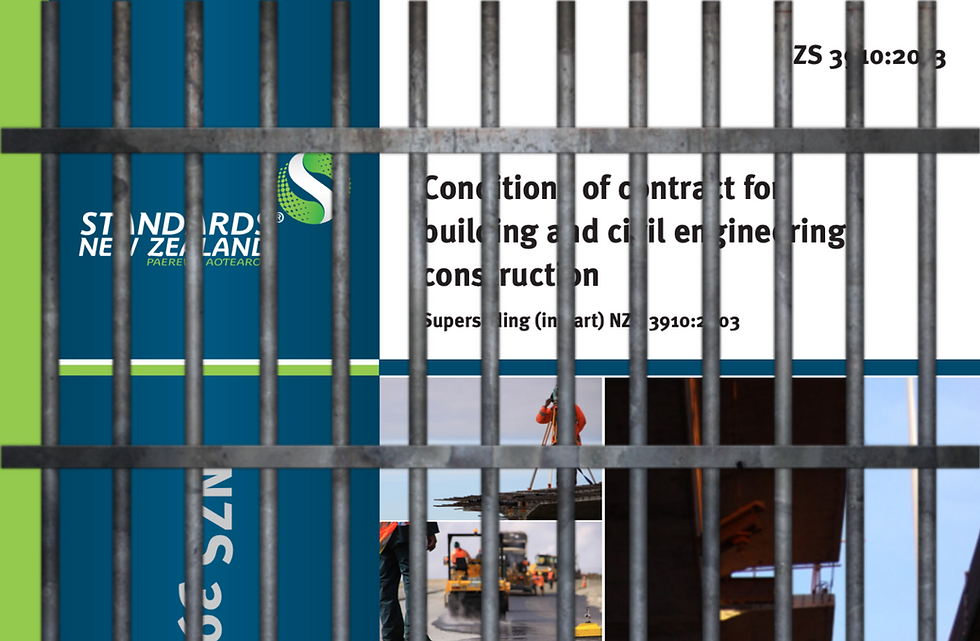Sustainable Resource Procurement – to Rebuild the Construction Industry
- The NZ Building Economist

- Oct 10, 2021
- 3 min read
Updated: Sep 30, 2023

“All consultants (lawyers, architects, engineers, project managers and quantity surveyors) should stand up to their clients and explain to them why short cuts, harsh clauses and penny-pinching are counterproductive in many ways.”
“There is an obsession with accepting the lowest price regardless of good reasons not to.”
“There is an obsession about requiring tendering for every project when that is not always appropriate.”
By Derek Firth: How to rebuild the construction industry. 30 Sep, 2018 05:00 PM [NZBE Link]
THE TWO BIGGEST SHORT CUTS
Shortcut #1 - Not providing a common measure of the scope of work (schedule of quantity’s) to ensure common basis of a market response (eliminating any doubt about what is required and reducing pricing and tender assessment mistakes).
Shortcut #2 - Not completing the Detailed Design before seeking a market response (being clear about what is required).
The more certain we are about the outturn cost of a project before committing to the build, the fewer dodgy projects, we allow to get off the ground, unsustainably under resourced.
These two shortcuts are endemic within an industry, at war with itself, just to survive!
To right the ship, the first thing you put back is the Detailed Design and the second thing you put back is a common form of measurement (SOQ), both before procurement.
LOWEST PRICE fallacy
Highest risk for chasing highest pay out, is for gamblers (high stakes / high returns, short time in market) not investors (low risk / steady returns, long time in the market).
For a small outlay, above the lowest price, you can insure against the worst of a collapsed main contractor and secure a party with a balance sheet that can finish your project. If you can afford this extra outlay, you can plan a successful project. If you cannot afford this extra outlay, why are you doing this project?
PROCUREMENT, WHEN YOUR BUILDER GOES BUST
So you took the lowest price option. Somewhere there is a balance to be struck between, relationships and making a living, and death, destruction and making a killing. Again, if you are in it for the long term, you will place relationships over lowest market headline dollar. But when the time to tender is lost, and you are in the middle of a project, fully committed to seeing it finish, and your builder goes bust, what price will you pay in negotiation to get the job finished? How much less would it have cost you to pay a little more upfront, at tender time, to avoid getting caught in the middle of a mess?
PROCUREMENT ETHICS
At the very least we could adopt a code of tendering ethics as Australia has done.
Tendering at all levels in the construction industry shall be conducted honestly and in a manner that is fair to all parties involved;
Parties shall comply with all legislative obligations, including those required by trade practices and consumer affairs legislation;
The Principal shall have regard to the costs of tendering and the number of tenderers, recognising that the cost of tendering is a significant industry overhead;
Tenderers shall only tender where they intend to carry out the work;
The Principal shall call for tenders only after the Principal has arranged funding for the project and has made a firm commitment to proceed with the project;
The conditions of tendering shall be the same for each tenderer;
Parties shall not engage in practices such as collusion on tenders, inflation of prices to compensate unsuccessful Tenderers, secret commissions or any other such improper arrangements;
The Principal and tenderers shall be prepared to attest to their probity, if necessary by statutory declaration and other reasonable means;
Tender documents shall specify the Principal’s requirements as clearly and precisely as possible and when documents are altered, sufficient time shall be allowed for all tenderers to review and revise their tenders;
The Principal shall specify what information in the tender documents is required to be treated by tenderers as confidential. However, it is acceptable to have public openings of tenders and disclosure of Tender prices;
Any party with a conflict of interest shall immediately disclose that conflict of interest.
A SUSTAINABLE BUILDING INDUSTRY
Rebuilding our industry is the gradual rebuilding of many balance sheets, over a long period of time following sustainable resource procurement principles. There are no get rich quick schemes and we have to stop operating in a get poor quick, least price, environment. The rules of procurement are at the heart of our opportunity to rebuild our industry. We must collaborate around a common set of procurement principals, we all agree to transparently abide by. Obviously before the competitive phase, so as not to restrict fair competition between organisations that qualify with capacity and capability to deliver, the next great innovation in sustainable building practice.
“Celebrating 50 years of New Zealand Building Economist 1972 to 2021”

By Matthew Ensoll
Life Member NZIQS. Reg.QS.
Editor New Zealand Building Economist.





Comments